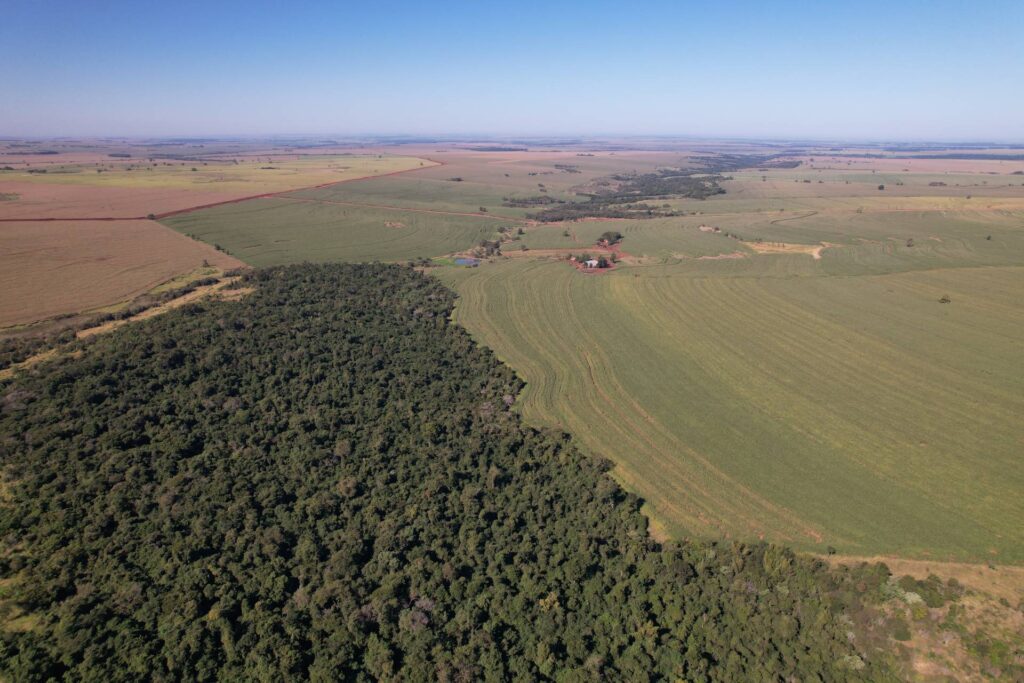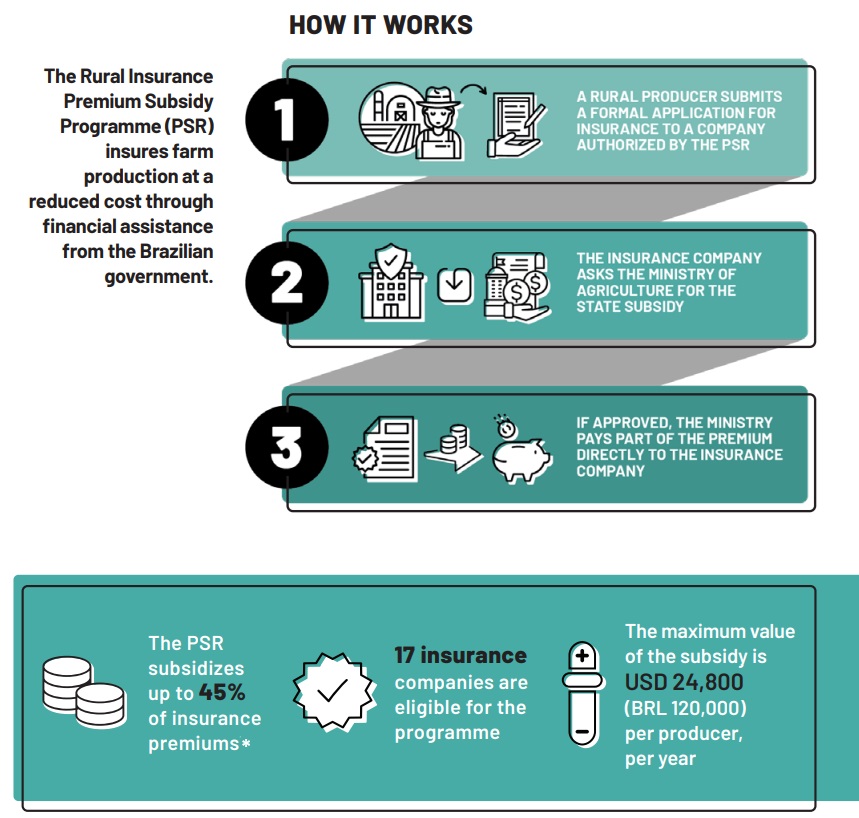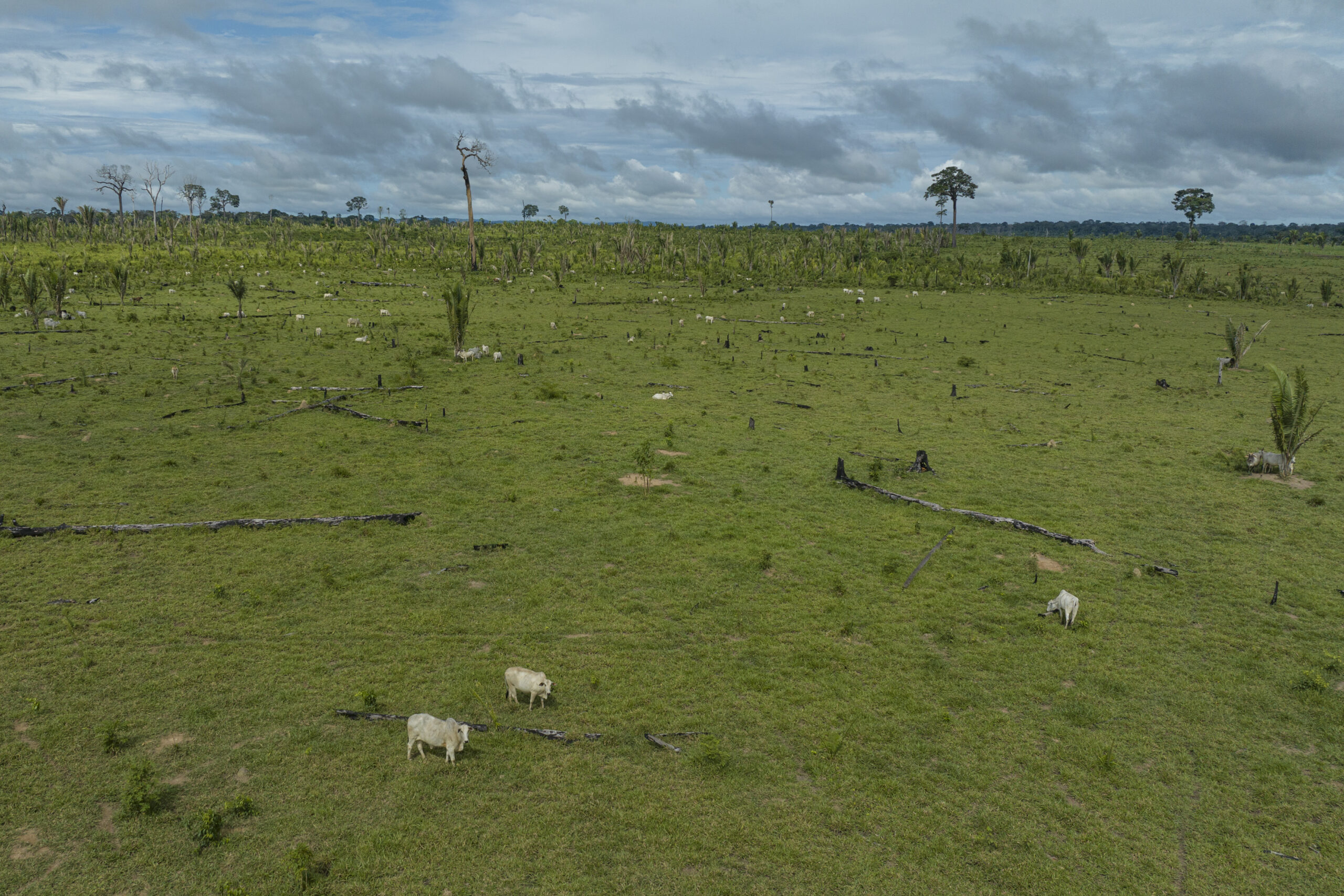SWISS RE, one of the world’s leading insurers, provided agricultural insurance to a farm notified by environmental inspection for illegal deforestation and two other agricultural areas that, according to the geographic coordinates on the policies, are located on properties partially overlapping traditional communities. The contracts, signed in 2024, received a total of 264,000 BRL (45,470 USD) in government subsidies.
The information was obtained by Repórter Brasil through data provided by the PSR (Rural Insurance Premium Subsidy Programme), which is managed by Mapa (Brazil’s Ministry of Agriculture and Livestock). With the programme, the federal government pays part of the premium as an incentive to the country’s agricultural production.
Before that, in November 2023, an article by Repórter Brasil had already identified other cases where Swiss Re insured crops overlapping indigenous land and farms with records of illegal deforestation. The investigation gave rise to a petition by the international organization Ekō demanding that the multinational company stop insuring irregular farms. The initiative has more than 66,000 signatures.
When asked about the new cases, the insurer did not comment on any of them specifically but responded that, in mid-2024, it improved its processes for analysing social and environmental risks. They began to include, for example, additional information provided by FUNAI [The National Foundation for Indigenous Peoples] and Conservation Units. Swiss Re also stated that “existing contracts that no longer meet the new standards will not be renewed.” Read the full statement here.
Farm on indigenous land
The Janaína Farm in Amambaí, State of Mato Grosso do Sul , has 43% of its area overlapping the Dourados-Amambaipeguá I IL (Indigenous Land), according to the property’s CAR (Rural Environmental Registry). In 2016, FUNAI published an anthropological report that delimited the area of the IL and recognized the right of the Guarani-Kaiowá indigenous people to its use. However, the process for the final official recognition of the indigenous land is being challenged in court by farmers, who continue to occupy the area.
Swiss Re provided insurance to corn plantations overlapping the Janaína Farm through at least five contracts signed between 2017 and 2024, according to PSR data. Based on satellite image analysis conducted by the Dutch organization Aid Environment at the request of Repórter Brasil, there are signs of plantations in the part of the farm that overlaps the IL.
The property belongs to Elamar Participações Agropecuárias. In October 2023, the company filed a lawsuit against the Federal Government demanding that data related to the farm’s overlap with indigenous land be removed from the CAR, claiming that the information would be preventing them from obtaining loans and agricultural insurance. The court denied the request and the lawsuit is underway in court.
When questioned by Repórter Brasil, Elamar stated in a note that “the insurance provided to the company is supported by a court decision that states that ‘in theory, merely entering the overlap data on the CAR (regarding the Janaína Farm) should not prevent it from receiving loans.” See the full response here.
The Dourados-Amambaipeguá I IL has a history of violent conflicts. In July 2024, the Ministry of Justice sent National Force troops to help protect the Guarani-Kaiowá indigenous people in the region.
“Insuring plantations in conflict areas is against international legislative and corporate standards, especially for companies committed to complying with Convention 169 – which addresses the rights of indigenous peoples – and following Environmental, Social and Corporate Governance (ESG) principles,” says Marco Antônio Delfino de Almeida, a Federal Prosecutor in Dourados, city of Mato Grosso do Sul, in an interview with Repórter Brasil in 2023. This is his opinion despite the fact that, according to him, there is no legal restriction to providing insurance, since the indigenous territory is still in the process of demarcation.

Cattle and quilombola land
Also in 2024, cattle rancher Ezequiel Sisnando Xenofonte Neto hired Swiss Re to protect his cattle in Santa Rita, State of Maranhão (MA). The geographic coordinates on the insurance policy, according to data from the PSR, coincide with the perimeter of the Cedro Farm, which belongs to his family and where a land conflict has been dragging on for decades. Still according to the PSR, the insurance is valid until June 2025.
An area that is home to 62 families, partially overlapping the Cetro Farm, was certified in 2022 as a remnant of a quilombo area by the Palmares Cultural Foundation and is in the process of land regularization. INCRA (The National Institute for Colonization and Agrarian Reform) reported that, due to the conflict, it met with the families and will prioritize the beginning of technical studies to identify and delimit the claimed area, known as Quilombo Cedro (read the full note).
In 2022, a court decision granted final possession of the area to Ezequiel Sisnando Xenofonte Filho, the father of the rancher insured by Swiss Re, but the repossession was suspended by the courts in 2024.
Father and son are being investigated by the Public Prosecution Service in Maranhão for poisoning the waters of a stream used by the quilombola (maroon-descendant) community with pesticides. In an investigation by the Civil Police, Xenofonte Neto was indicted for causing harm to the residents.
In addition, community residents accuse Xenofonte Filho of demolishing homes and making violent threats, using firearms. The allegations are part of ongoing lawsuits. In 2023, a first-level court sentenced him to one month and eighteen days in prison for threatening a quilombola leader.
Repórter Brasil spoke to Xenofonte Neto by phone. Initially, he stated that he had never received insurance with subsidies from the federal government. Regarding the conflict with the quilombola community, the farmer stated: “This quilombo was forged. They forged the quilombo to stay on my property.” The rancher also requested that any questions be sent by email but had not responded by the date of publication. Repórter Brasil was unable to contact Xenofonte Filho directly. The space remains available for future statements.
Deforestation in the Cerrado biome
The deforested area crosses four contiguous farms delimited by different CAR registrations – all belonging to the Hendges family. The insurance contract with Swiss Re covers crops on three of these properties, totalling 293 hectares of coverage.
In April 2024, farmer Edinilson Roberto Hendges hired Swiss Re to protect his soybean plantation at the Rio Verde Farm in Riachão das Neves, State of Bahia (BA). In August 2023, months before that, the property was fined by INEMA (Bahia’ state Institute of Environment and Water Resources) for illegal deforestation in Cerrado areas. According to PSR data, the insurance is valid until June 2025.
According to Inema, 162.3 hectares were illegally deforested on all properties. In a telephone interview with Repórter Brasil, Ednilson Hendges stated that the deforestation occurred after he fell for a scam. According to him, a woman who claimed to be an environmental consultant offered local farmers to arrange vegetation removal licenses for monthly fees. Hendges later found out that the licenses were fake. The farmer filed a police report about the case. The consultant is being sued for fraud and falsification of public documents.
Hendges also reported that he signed a TAC (Conduct Adjustment Agreement) with INEMA, paid the fine and is making the necessary environmental compensation. He also stated that the insured plantations are not in the areas that were notified, but rather in other parts of the farms where no illegal deforestation was found.

Subsidized insurance
In all three cases, the policies signed with Swiss Re were subsidized by the federal government. In November 2023, the agency reported that a system would be implemented the following year to check for social and environmental irregularities in areas covered by the subsidy. However, in November 2024, after further questioning, the ministry revealed that the plans had been postponed until the first half of 2025. We had not received a response about the current status of the initiative by the time this report was published.
933.1 million BRL (162.5 million USD) in government funds were allocated to rural insurance contracts in 2023, according to information from the PSR 2023 report, published by MAPA. The data for 2024 has not yet been released.
“If there are public resources involved, the duty to monitor is undeniable. That is, the duty to follow the law, to not be jointly responsible for the violation of environmental or social rights,” says Manoela Roland, a researcher at Homa-UFJF (the Centre for Human Rights and Business at the Federal University of Juiz de Fora).
In its guidelines for more sustainable credit policies, the Climate Policy Initiative (CPI/PUC-Rio) suggests that PSR subsidies should follow, at the very least, the same restrictions that already apply to rural credit. The Central Bank’s rules prohibit granting credit to “enterprises whose area is entirely or partially located on land occupied by and titled to descendants of quilombola communities.” The rules also prohibit granting credit to properties with areas under embargo or overlapping Conservation Units.


